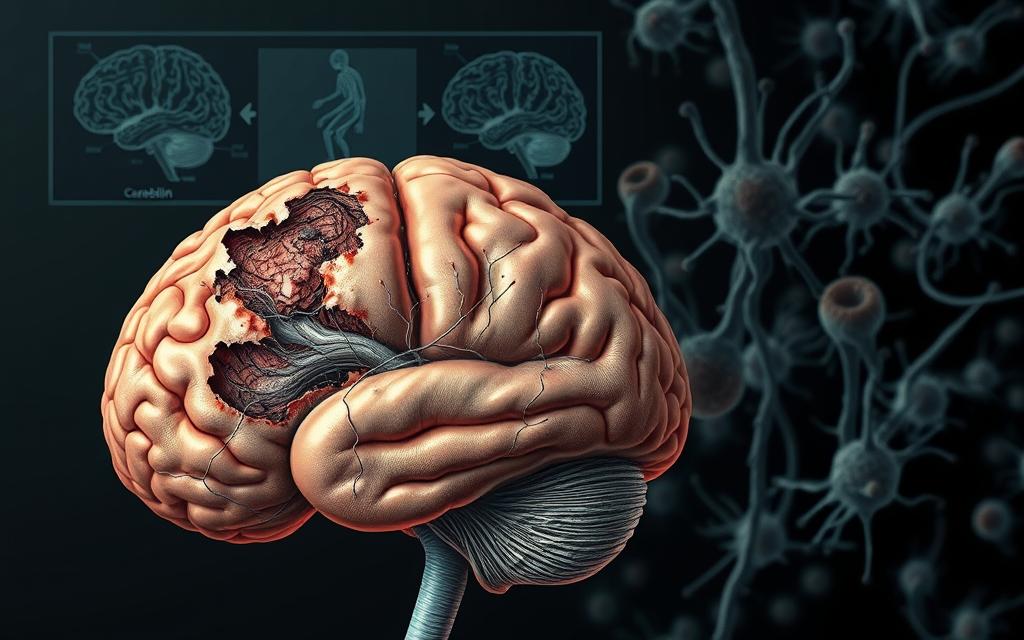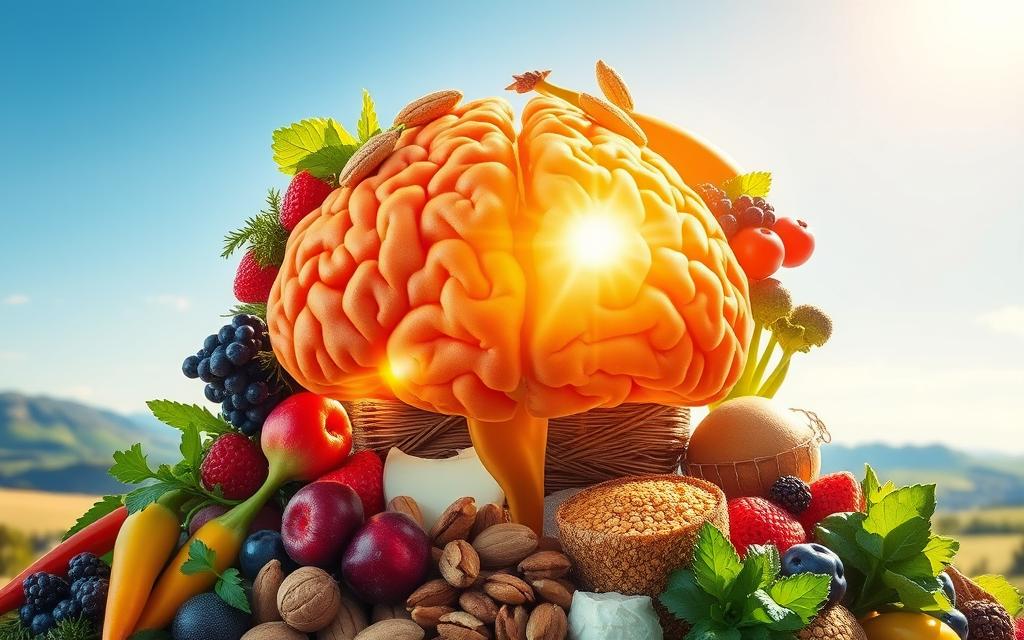Have you ever felt foggy, forgetful, or just not yourself? It might be more than just stress or lack of sleep. Your brain relies on essential nutrients to function at its best, and one of the most critical is Vitamin B12. This nutrient plays a vital role in maintaining your central nervous system and producing healthy red blood cells. Without it, your brain health can suffer significantly.
Research shows that a deficiency in this nutrient can lead to cognitive decline and neurological complications. For example, higher levels of certain markers linked to deficiency were associated with lower cognitive test scores and reduced brain volume1. This highlights the importance of ensuring you get enough of this nutrient in your diet.
In this article, we’ll explore how a lack of Vitamin B12 affects your brain, the symptoms to watch for, and practical steps to prevent deficiency. Let’s dive in and take control of your brain health.
Key Takeaways
- Vitamin B12 is essential for brain health and cognitive function.
- A deficiency can lead to memory loss and neurological issues.
- High levels of certain markers are linked to lower cognitive scores1.
- Ensuring adequate intake can help maintain brain volume and function.
- Early detection and prevention are key to avoiding long-term effects.
Overview of Vitamin B12 and Brain Health
Your brain’s health depends on a key nutrient that often goes unnoticed. Known as cobalamin, this nutrient is essential for maintaining nerve function and producing healthy red blood cells. Without it, your cognitive abilities and overall brain health can suffer significantly.
This nutrient plays a critical role in protecting your nerves and ensuring proper brain function. It also helps in the formation of red blood cells, which carry oxygen to your brain and other organs. An adequate supply is vital for maintaining focus, memory, and mental clarity2.
Research shows that low levels of this nutrient can lead to serious medical conditions. For example, older adults and individuals with digestive disorders are at a higher risk of deficiency3. Ensuring you get enough through diet or supplements is crucial for long-term brain health.
“Adequate levels of this nutrient are essential for protecting cognitive function and preventing neurological complications.”
Here’s a quick overview of its key benefits:
- Supports nerve protection and brain function.
- Essential for red blood cell formation.
- Helps maintain healthy cognitive abilities.
Natural sources include animal products like fish, lean meat, and eggs. Fortified foods, such as breakfast cereals, are also excellent options3. Including these in your diet can help you maintain optimal levels and support your brain health.
| Key Functions | Sources |
|---|---|
| Nerve protection | Fish, lean meat |
| Red blood cell formation | Eggs, fortified cereals |
| Cognitive health | Low-fat milk, poultry |
By understanding its importance and ensuring adequate intake, you can take proactive steps to protect your brain and overall health.
Understanding Vitamin B12 Deficiency
Are you aware of the silent risks lurking in your diet? A deficiency in this essential nutrient can lead to serious health issues, especially for your brain. It occurs when your body doesn’t get enough of it, either due to poor dietary intake or absorption problems4.
Certain groups are at higher risk. For example, older adults and those with digestive disorders often struggle to absorb it properly. Additionally, individuals following strict vegan or vegetarian diets may lack sufficient intake, as this nutrient is primarily found in animal-based foods5.
Regular blood tests are crucial for monitoring your levels. Research shows that even mild deficiency can lead to symptoms like fatigue and weakness, while severe cases may cause neurological damage6. Early detection is key to preventing long-term effects.
Here’s a quick look at who is most at risk:
- Older adults with reduced absorption capabilities.
- Individuals with digestive disorders like Crohn’s disease.
- Those following vegan or vegetarian diets.
Understanding the deficiency is the first step toward prevention. By addressing dietary gaps and monitoring your levels, you can protect your brain and overall health.
| Risk Factors | Prevention Tips |
|---|---|
| Poor dietary intake | Include animal-based foods like fish and eggs. |
| Digestive disorders | Consult a doctor for regular blood tests. |
| Vegan/vegetarian diets | Opt for fortified foods or supplements. |
How Deficiency Impacts Cognitive Function
Cognitive function relies heavily on essential nutrients, and a deficiency can have serious consequences. One key factor is the role of stomach acid in releasing nutrients from food for absorption. Without adequate acid levels, your body struggles to absorb what it needs, leading to potential cognitive issues7.
This nutrient is also crucial for producing healthy red blood cells. These cells carry oxygen to your brain, ensuring it functions optimally. When production is impaired, your brain may not get enough oxygen, resulting in memory loss and confusion8.
Research shows that low levels of this nutrient are linked to diseases that affect cognitive ability. For example, studies indicate that deficiency increases the risk of Alzheimer’s by 2.5 times in older adults7. This highlights the importance of maintaining adequate levels for long-term brain health.
Here’s what you need to know:
- Stomach acid plays a vital role in nutrient absorption.
- Healthy red blood cell production is essential for brain oxygen supply.
- Deficiency can lead to serious cognitive diseases.
By understanding these connections, you can take steps to protect your cognitive function and overall health.
Recognizing Neurological Symptoms
Have you noticed unusual tingling or numbness in your hands or feet? These could be early signs of a nutrient deficiency affecting your nervous system. Neurological symptoms often vary in severity from person to person, making them easy to overlook9.

Low blood levels of this essential nutrient are closely linked to declining neurological health. Studies show that symptoms like difficulty with balance and memory issues are common in individuals with deficiencies10. Early detection is crucial to prevent long-term damage.
Here’s what to watch for:
- Numbness or tingling in the extremities.
- Difficulty maintaining balance or coordination.
- Persistent memory problems or confusion.
Long-term deficiency can lead to more severe cognitive issues. For example, research indicates that low blood levels are associated with abnormal myelination and defective nerve transmission10. Regular monitoring and early intervention can help maintain neurological health.
By recognizing these symptoms and addressing them promptly, we can protect our nervous system and overall well-being.
Memory Loss and Cognitive Decline: The Hidden Effects
Memory loss and cognitive decline can be subtle yet alarming signs of a deeper issue. These symptoms are often overlooked but may indicate a chronic deficiency in essential nutrients. Adults, in particular, are more vulnerable to these hidden effects11.
Research shows that low levels of this nutrient are closely linked to cognitive decline. For example, studies indicate that individuals with deficiencies often experience memory issues and reduced mental clarity12. This is especially concerning for older adults, who are at higher risk due to age-related absorption problems.
Supplements can play a crucial role in preventing or mitigating these effects. Many adults find that incorporating supplements into their routine helps maintain cognitive function and overall brain health13. However, it’s essential to consult a healthcare provider before starting any regimen.
“Timely intervention with supplements can significantly improve cognitive outcomes, especially in older adults.”
Pernicious anemia is another major risk factor for severe cognitive impairments. This condition prevents the body from absorbing the nutrient properly, leading to long-term neurological damage11. Early detection and treatment are key to preventing irreversible effects.
Here’s a quick overview of how to address these hidden effects:
- Monitor cognitive health regularly, especially in older adults.
- Consider supplements if dietary intake is insufficient.
- Seek medical advice for conditions like pernicious anemia.
| Risk Factors | Prevention Strategies |
|---|---|
| Age-related absorption issues | Include fortified foods in your diet. |
| Pernicious anemia | Consult a doctor for regular blood tests. |
| Insufficient dietary intake | Use supplements as recommended. |
By understanding these hidden effects and taking proactive steps, we can protect our cognitive health and maintain mental clarity as we age.
Physical Signs Beyond the Brain: Skin, Hair, and Nails
Did you know that your skin, hair, and nails can reveal more about your health than you might think? While we often focus on internal symptoms, physical changes can be early indicators of a deeper issue. For example, 30% of patients with deficiency report hair loss, mouth ulcers, or blurred vision14.

These external signs are closely linked to your body’s internal balance. Skin discoloration, brittle nails, and thinning hair are common symptoms that often go unnoticed. They can signal a lack of essential nutrients, which play a critical role in maintaining overall health15.
Here’s what to watch for:
- Pale or yellowish skin, often a sign of anemia.
- Hair loss or thinning, especially in high-risk individuals.
- Brittle or ridged nails, indicating nutrient imbalances.
These physical manifestations are often early warnings. Addressing them promptly can help prevent more severe complications. For instance, untreated deficiency can lead to neurological damage, with symptoms like numbness or tingling in extremities15.
By paying attention to these signs, we can take proactive steps to protect our body and overall well-being. Early detection is key to maintaining both internal and external health.
The Connection Between Vitamin B12 and Red Blood Cells
Have you ever wondered how your body creates new cells? This process relies heavily on essential nutrients, and one of the most critical is involved in DNA synthesis. Without it, your body struggles to produce healthy red blood cells, leading to conditions like anemia16.
Role in DNA Synthesis
DNA synthesis is the foundation of cell creation. This nutrient plays a key role in ensuring that your body can replicate cells effectively. When levels are low, the process is disrupted, leading to fewer and less functional red blood cells17.
Here’s how it works:
- It helps in the formation of DNA, which is essential for cell division.
- Without it, cells cannot replicate properly, leading to a reduced count.
- This disruption can cause fatigue and other symptoms of anemia16.
Impact on Anemia
Anemia occurs when your body doesn’t have enough healthy red blood cells to carry oxygen. This nutrient deficiency is a common cause, as it directly affects cell production16. Symptoms include fatigue, pale skin, and shortness of breath.
Treatment often involves addressing the underlying deficiency. For example, monthly injections are recommended for those with absorption issues16. Early diagnosis and intervention can prevent long-term complications.
By understanding this connection, we can take steps to maintain healthy cell production and prevent anemia.
Vitamin B12 and Its Influence on Mental Health
Mental health struggles can often be traced back to nutrient imbalances. Essential nutrients play a critical role in maintaining emotional stability and cognitive function. When levels are low, it can lead to significant mental health challenges, including depression and mood swings18.

Link to Depression
Low levels of this nutrient are closely linked to depression. Research shows that individuals with deficiencies often experience symptoms like exhaustion, brain fog, and a lack of interest in activities18. A 2005 study found that daily supplementation can improve treatment outcomes for those struggling with depression18.
Here’s what you need to know:
- Deficiency can mimic symptoms of depression, making it harder to diagnose.
- Older adults and those with digestive disorders are at higher risk18.
- Supplementation can be an effective part of treatment.
Stress and Mood Swings
Stress and mood fluctuations are also influenced by nutrient levels. When your body lacks essential nutrients, it struggles to produce healthy red blood cells, which are vital for oxygen transport to the brain19. This imbalance can lead to irritability, confusion, and even paranoia19.
“Maintaining adequate nutrient levels is essential for emotional stability and stress management.”
Key factors to consider:
- Nutrient deficiencies can disrupt brain function, leading to mood swings.
- Proper supplementation can help restore balance and improve mental health18.
- Regular monitoring is crucial for those at risk.
| Mental Health Symptom | Nutrient Connection |
|---|---|
| Depression | Low levels linked to exhaustion and brain fog18. |
| Stress | Impaired red blood cell production affects brain oxygen supply19. |
| Mood Swings | Deficiency can cause irritability and confusion19. |
By understanding these connections, we can take proactive steps to support our mental health. Ensuring adequate nutrient intake is a simple yet powerful way to protect our emotional well-being.
Dietary Sources of Vitamin B12 and Preventive Tips
Maintaining optimal nutrient levels is essential for overall health, and certain foods play a key role in achieving this. A balanced diet rich in specific nutrients can help prevent deficiencies and support long-term well-being.
Animal-based foods are the primary sources of this essential nutrient. For example, eggs and dairy products contribute a significant amount to your daily intake. Including these in your meals ensures you meet the recommended vitamin b12 level for your age group20.
- Lean meats like beef and poultry.
- Fish, especially salmon and tuna.
- Eggs, which are versatile and nutrient-dense.
- Dairy products such as milk, cheese, and yogurt.
- Fortified cereals and nutritional yeast for plant-based options.
Combining these foods can help you achieve the necessary amount daily. For instance, a breakfast of fortified cereal with milk and an egg provides a solid start to your day21.
Preventive measures are equally important. Older adults, vegetarians, and those with digestive disorders should pay extra attention to their diet. Regular blood tests can help monitor your vitamin b12 level and ensure you’re on track20.
Here are some practical tips to maintain optimal levels:
- Include at least one animal-based food in every meal.
- Choose fortified products if you follow a plant-based diet.
- Consult a healthcare provider for personalized dietary advice.
By focusing on these dietary sources and preventive strategies, we can protect our health and avoid the risks associated with deficiencies.
Supplements and Fortified Foods for Boosting Vitamin B12 Levels
Not getting enough essential nutrients from your diet? Supplements and fortified foods can bridge the gap. For those with dietary restrictions or absorption issues, these alternatives are a practical solution to maintain optimal health22.

Supplements come in various forms, including pills, sublingual tablets, and injections. Research shows that daily oral supplements or injections can significantly improve nutrient levels, especially for individuals with deficiencies22. For example, a 2011 study found that 90 days of supplementation effectively replenished low levels22.
Fortified foods, such as cereals and plant-based milk, are another excellent option. A 2016 review highlighted that fortified products can provide up to 733% of the daily value, making them a convenient choice for those following a plant-based diet22.
Protein-rich supplements also play a vital role in supporting overall health. They aid in DNA synthesis and cell production, ensuring your body functions optimally23. Including these in your routine can help prevent deficiencies and promote long-term well-being.
Here’s how to choose the right supplement:
- Consult a healthcare provider to determine your specific needs.
- Opt for sublingual tablets if you have absorption issues.
- Include fortified foods like cereals and nutritional yeast in your diet.
By incorporating supplements and fortified foods, you can ensure your body gets the nutrients it needs to thrive. Early intervention and proper selection are key to maintaining health and preventing deficiencies.
How Our Bodies Absorb Vitamin B12
Understanding how our bodies process nutrients is key to maintaining health. One essential nutrient requires a specific protein for absorption, ensuring it reaches our bloodstream effectively. This process is vital for overall well-being.
Role of Intrinsic Factor
Intrinsic factor, a protein produced in the stomach, binds to this nutrient, enabling its absorption. Without it, the body struggles to absorb the nutrient, leading to potential deficiencies24. This highlights the importance of a healthy stomach environment.
For example, individuals with intrinsic factor defects absorb very little of this nutrient, often requiring medical intervention24. Ensuring proper stomach function is crucial for optimal absorption.
The Absorption Process
The journey begins in the stomach, where intrinsic factor binds to the nutrient. From there, it moves to the small intestine, where it’s absorbed into the bloodstream24. This process ensures the nutrient reaches cells throughout the body.
Foods like dairy and fish are excellent sources, providing the nutrient in a form that’s easily absorbed25. Including these in your diet supports the absorption process and maintains healthy levels.
“A healthy stomach environment is essential for optimal nutrient absorption.”
Here’s a quick overview of the steps involved:
- Intrinsic factor binds to the nutrient in the stomach.
- The complex moves to the small intestine for absorption.
- The nutrient enters the bloodstream and reaches cells.
| Key Step | Details |
|---|---|
| Binding | Intrinsic factor binds to the nutrient in the stomach24. |
| Absorption | Occurs in the small intestine24. |
| Transport | Nutrient enters the bloodstream and reaches cells24. |
By understanding this process, we can take steps to support our body’s ability to absorb essential nutrients. Including dairy and fish in our diet is a simple yet effective way to maintain health.
The Impact of Age and Lifestyle on Vitamin B12 Levels
As we age, our bodies undergo changes that can affect how we absorb essential nutrients. One critical factor is the production of intrinsic factor, a protein necessary for nutrient absorption. Studies show that up to 20% of people over 60 become deficient due to reduced intrinsic factor production26.

Lifestyle choices also play a significant role in maintaining optimal nutrient levels. For example, a sedentary lifestyle or poor diet can further reduce absorption. Research indicates that individuals who sit for more than 7 hours daily are at higher risk of deficiency27.
Here’s how age and lifestyle impact nutrient absorption:
- Reduced intrinsic factor production with aging26.
- Sedentary habits and poor dietary choices27.
- Certain medications that interfere with absorption28.
Long-term deficiency can lead to cognitive decline and other health issues. A 2006 study recommends that older adults intake 500 micrograms daily to restore low levels28. Regular testing and targeted interventions are crucial for maintaining health.
| Factor | Impact |
|---|---|
| Aging | Reduced intrinsic factor production26. |
| Lifestyle | Sedentary habits and poor diet27. |
| Medications | Interfere with absorption28. |
By understanding these factors, we can take proactive steps to maintain optimal nutrient levels and protect our long-term health.
Managing Vitamin B12 Deficiency with Medical Guidance
Are you experiencing fatigue, memory lapses, or mood swings? These could be signs of a deeper issue. Managing a deficiency often requires professional medical guidance and tailored treatment to address the root cause29.
When symptoms like numbness, confusion, or persistent fatigue arise, it’s crucial to seek a medical diagnosis. Blood tests can confirm deficiency, with sensitivity rates as high as 95% for certain markers29. Early detection is key to preventing long-term complications.
Treatment options vary depending on the severity of the deficiency. For mild cases, dietary adjustments and oral supplements may suffice. However, individuals with absorption issues often require monthly injections to restore healthy levels30.
Women and older adults have specific nutritional needs that must be addressed. For example, pregnant women require higher daily intakes to support fetal development, while older adults may need fortified foods due to reduced absorption capabilities31.
Case studies highlight the effectiveness of tailored treatment protocols. For instance, patients with neurological symptoms often show improvement within six weeks to three months of starting therapy30. Consistent follow-up ensures sustained recovery.
“Professional guidance is essential for managing deficiencies effectively and preventing irreversible damage.”
Here’s a summary of treatment options based on individual needs:
| Treatment Type | Details |
|---|---|
| Oral Supplements | Daily intake for mild deficiencies29. |
| Injections | Monthly doses for severe cases or absorption issues30. |
| Fortified Foods | Ideal for older adults and those with dietary restrictions31. |
If you’re experiencing concerning symptoms, don’t hesitate to consult a healthcare provider. Early intervention can make a significant difference in your health and well-being.
Debunking Common Myths About Vitamin B12
Is it true that only animal products can provide this essential nutrient? Many believe this, but fortified foods like cereals and plant-based milk are also excellent sources32. Including these in your diet ensures you meet the recommended level vitamin b12 for your age group.

Another common myth is that b12 supplements are unnecessary if you eat a balanced diet. However, individuals with absorption issues or dietary restrictions often benefit from supplements. For example, older adults and those with digestive disorders may require monthly injections to maintain healthy levels33.
“Supplements are a practical solution for those who cannot meet their needs through diet alone.”
Some claim that high doses of b12 supplements can cure memory issues or Alzheimer’s. Research shows that megadoses of 1,000 micrograms have no significant benefits for these conditions32. Instead, supplements are most effective for individuals with existing deficiencies.
Here’s what you need to know about maintaining optimal level vitamin b12:
- Include both animal products and fortified foods in your diet.
- Consult a healthcare provider to determine if b12 supplements are necessary.
- Regular blood tests can help monitor your levels and ensure you’re on track33.
By debunking these myths, we can make informed choices about our health. Whether through diet or supplements, ensuring adequate intake is key to maintaining overall well-being.
Our Approach to a Healthier Brain: Vitamin B12 and Lifestyle Choices
What if the key to a sharper mind lies in the choices we make every day? Research shows that adopting a lifestyle rich in essential nutrients and mindful habits can significantly improve brain health. One critical nutrient, known as cobalamin, plays a vital role in this process34.
Understanding the different forms of this nutrient is essential. Cobalamin, the active form, is crucial for nerve function and red blood cell production. Ensuring adequate intake supports cognitive clarity and overall well-being35.
Efficient absorption is another key factor. A healthy stomach environment, including sufficient intrinsic factor production, is necessary for optimal nutrient uptake. Up to 30% of older adults struggle with absorption due to changes in stomach acid34.
Here are actionable strategies to support brain health:
- Include nutrient-rich foods like fish, eggs, and fortified cereals in your diet.
- Consider supplements if dietary intake is insufficient, especially for older adults.
- Monitor absorption issues and consult a healthcare provider for personalized advice.
These choices not only prevent deficiency but also contribute to improved cognitive function. For example, supplementation has been shown to reduce homocysteine levels by 31.9% in individuals with mild cognitive impairment34.
Here’s a quick guide to nutrient-rich foods and their benefits:
| Food Source | Nutrient Content |
|---|---|
| Cooked beef liver | 23.5 mcg per ounce (981% DV)34 |
| Fortified nutritional yeast | 15 mcg per 2 tablespoons (630% DV)34 |
| Cooked salmon | 2.6 mcg per 3-ounce serving (108% DV)34 |
By prioritizing these lifestyle choices, we can protect our brain health and enjoy a sharper, more focused mind. Early intervention and consistent habits are the foundation of long-term well-being.
Conclusion
Taking control of your brain health starts with understanding the essentials. A deficiency in this key nutrient can lead to cognitive decline, memory loss, and neurological symptoms like numbness or tingling. Research shows that up to 20% of individuals over 60 experience deficiency due to reduced absorption capabilities36.
Proper dietary intake and supplementation are crucial for maintaining optimal levels. Including fortified foods or considering a vitamin b12 supplement can help bridge the gap, especially for older adults or those with dietary restrictions. Early detection through regular blood tests is vital to prevent long-term complications.
We encourage you to seek medical advice if you notice symptoms like fatigue, confusion, or mood swings. Exploring trusted product options can support your journey toward better brain health. Take the first step today and prioritize your well-being.
FAQ
How does a lack of this nutrient affect brain health?
A deficiency can lead to cognitive decline, memory loss, and even neurological symptoms like tingling or numbness. It’s essential for maintaining healthy nerve cells and brain function.
What are the common signs of low levels in the body?
Symptoms include fatigue, weakness, pale skin, and difficulty concentrating. Neurological signs like balance issues or mood changes may also appear.
Can this deficiency cause mental health issues?
Yes, low levels are linked to depression, anxiety, and mood swings. It plays a role in producing brain chemicals that regulate emotions.
How does it impact red blood cells?
It’s crucial for DNA synthesis and red blood cell production. A deficiency can lead to anemia, causing fatigue and weakness.
What foods are rich in this nutrient?
Animal products like meat, fish, eggs, and dairy are excellent sources. Fortified foods and supplements can also help boost levels.
How does age affect absorption?
As we age, our bodies may produce less intrinsic factor, a protein needed for absorption. This increases the risk of deficiency in older adults.
Can supplements help manage low levels?
Yes, supplements are effective for raising levels, especially for those with absorption issues or dietary restrictions. Always consult a healthcare provider for guidance.
What role does intrinsic factor play in absorption?
Intrinsic factor is a protein in the stomach that binds to the nutrient, allowing it to be absorbed in the small intestine. Without it, absorption is impaired.
Are there physical signs beyond brain-related symptoms?
Yes, low levels can affect skin, hair, and nails, leading to pale skin, hair loss, or brittle nails. It’s a sign of overall nutrient imbalance.
How can we prevent deficiency?
Eating a balanced diet rich in animal products, considering fortified foods, and taking supplements if needed can help maintain healthy levels.
Source Links
- American Academy of Neurology: Neurology Resources – https://www.aan.com/PressRoom/Home/PressRelease/986
- Vitamin B12 – The Nutrition Source – https://nutritionsource.hsph.harvard.edu/vitamin-b12/
- Vitamin B-12 and depression: Are they related? – https://www.mayoclinic.org/diseases-conditions/depression/expert-answers/vitamin-b12-and-depression/faq-20058077
- Vitamin B12 Deficiency Anemia – https://www.hopkinsmedicine.org/health/conditions-and-diseases/vitamin-b12-deficiency-anemia
- Vitamin B12 Deficiency: Causes, Symptoms, and Treatment – https://www.webmd.com/diet/vitamin-b12-deficiency-symptoms-causes
- Office of Dietary Supplements – Vitamin B12 – https://ods.od.nih.gov/factsheets/VitaminB12-HealthProfessional/
- Cognitive impairment and vitamin B12: a review | International Psychogeriatrics | Cambridge Core – https://www.cambridge.org/core/journals/international-psychogeriatrics/article/cognitive-impairment-and-vitamin-b12-a-review/2EE3400E317E7C82300369F195A7FEBD
- Association between Vitamin B12 levels and cognitive function in the elderly Korean population – https://pmc.ncbi.nlm.nih.gov/articles/PMC7387066/
- Neurological symptoms of vitamin B12 deficiency: analysis of pediatric patients* – https://pmc.ncbi.nlm.nih.gov/articles/PMC6884369/
- Vitamin B12-Associated Neurological Diseases: Background, Pathophysiology, Epidemiology – https://emedicine.medscape.com/article/1152670-overview
- Low Vitamin B12 Levels: An Underestimated Cause Of Minimal Cognitive Impairment And Dementia – https://pmc.ncbi.nlm.nih.gov/articles/PMC7077099/
- B Vitamins and the Brain: Mechanisms, Dose and Efficacy—A Review – https://pmc.ncbi.nlm.nih.gov/articles/PMC4772032/
- Multivitamins Help Prevent Memory Loss, Finds Major Study – https://magazine.columbia.edu/article/multivitamins-help-prevent-memory-loss-finds-major-study
- Symptoms of B12 deficiency – B12 institute – https://b12-institute.nl/en/symptoms-of-b12-deficiency/
- What Happens When Your B12 Is Low—and How To Fix It – https://www.health.com/nutrition/21-important-facts-about-vitamin-b12-deficiency
- Vitamin B12 deficiency anemia: MedlinePlus Medical Encyclopedia – https://medlineplus.gov/ency/article/000574.htm
- Measurement of red blood cell-vitamin B12: a study of the correlation between intracellular B12 content and concentrations of plasma holotranscobalamin II – PubMed – https://pubmed.ncbi.nlm.nih.gov/8352241/
- Vitamin B-12 Deficiency and Depression: What’s the Link? – https://www.healthline.com/health/depression/b12-and-depression
- What to Know About Vitamins and Mental Health – https://www.webmd.com/vitamins-and-supplements/what-to-know-about-vitamins-and-mental-health
- Office of Dietary Supplements – Vitamin B12 – https://ods.od.nih.gov/factsheets/VitaminB12-Consumer/
- Vitamin B-12 – https://www.mayoclinic.org/drugs-supplements-vitamin-b12/art-20363663
- Vitamin B12 Foods: 12 Great Sources – https://www.healthline.com/nutrition/vitamin-b12-foods
- Vitamin B12 foods: What to eat and avoid – https://www.medicalnewstoday.com/articles/vitamin-b12-foods
- Vitamin B12 Absorption – https://veganhealth.org/vitamin-b12/vitamin-b12-absorption/
- Vitamin B12 (Cobalamin) Information | Mount Sinai – https://www.mountsinai.org/health-library/supplement/vitamin-b12-cobalamin
- Chance of B12 deficiency increases as people age – https://www.uclahealth.org/news/article/chance-of-b12-deficiency-increases-as-people-age
- Prevalence and Indicators of Vitamin B12 Insufficiency among Young Women of Childbearing Age – https://pmc.ncbi.nlm.nih.gov/articles/PMC7792587/
- What Causes B12 Deficiency in Older Adults? – https://us.betteryou.com/blogs/conditions/what-causes-b12-deficiency-in-older-adults
- Vitamin B12 Deficiency: Recognition and Management – https://www.aafp.org/pubs/afp/issues/2017/0915/p384.html
- Diagnosis, Treatment and Long-Term Management of Vitamin B12 Deficiency in Adults: A Delphi Expert Consensus – https://pmc.ncbi.nlm.nih.gov/articles/PMC11050313/
- Vitamin B12 Deficiency: Signs, Causes and Treatments | Ada – https://ada.com/conditions/vitamin-b12-deficiency/
- Vitamin B12: What It Can Do, and What It Can’t – https://www.webmd.com/diet/features/b12-truths-myths
- Debunking Four Myths About Vitamin B12 – https://www.trivita.com/debunking-b12-myths/?srsltid=AfmBOoqpw_6i2Kp_nFtQt1_ilD2LJxlsQpW9Nh30SEI720yUeQnzRNva
- What to Know About Taking B12 Supplements – https://www.health.com/vitamin-b12-7252832
- Vitamin B12 and Cognitive Function: An Evidence-Based Analysis – https://pmc.ncbi.nlm.nih.gov/articles/PMC3874776/
- Vitamin B-12: Benefits, foods, deficiency, and supplements – https://www.medicalnewstoday.com/articles/219822
